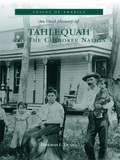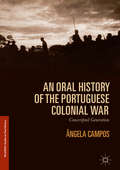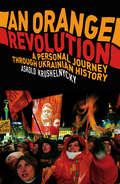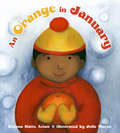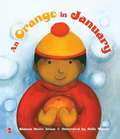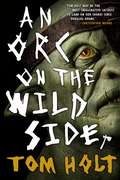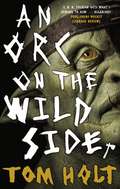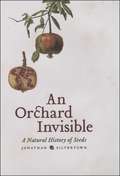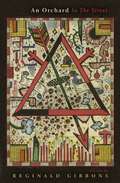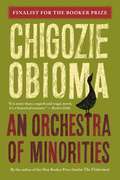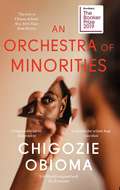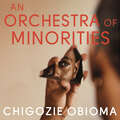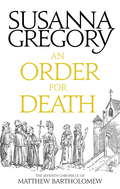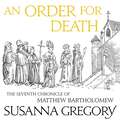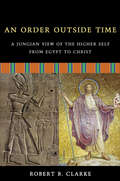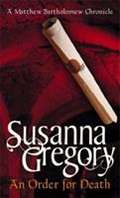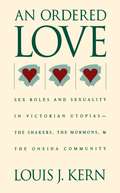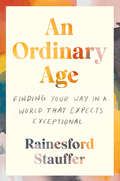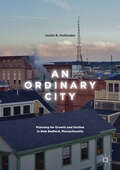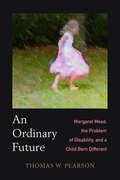- Table View
- List View
An Oral History of Tahlequah and The Cherokee Nation
by Deborah L. DuvallThese pages are filled with memories and favorite tales that capture the essence of life in the Cherokee Nation. Ms. Duvall invites the reader to follow the tribe from its pre-historic days in the southeast, to early 20th century life in the Cookson Hills of Oklahoma. Learn about Pretty Woman, who had the power over life and death, or the mystical healing springs of Tahlequah. Spend some time with U.S. Deputy Marshals as they roam the old Cherokee Nation in pursuit of Indian Territory outlaws like Zeke Proctor and Charlie Wickliffe, or wander the famous haunted places where ghost horses still travel an ancient trail and the spirits of long-dead Spaniards still search for gold.
An Oral History of the Portuguese Colonial War: Conscripted Generation (Palgrave Studies in Oral History)
by Ângela CamposThis book explores the lived memory of the Portuguese colonial war (1961-1974) through the analysis of thirty-six oral history interviews with ex-combatants of this conflict. The meanings that the combatants attributed to their war experiences then and now are the book's analytical focus. This project seeks to answer the following questions: how has the public memory of this colonial conflict developed in Portugal from 1974 to approximately 2010? what issues does an oral historian encounter when conducting interviews with veterans on a past that remains traumatic for many? what were - and are - the most significant aspects of the war experience and its aftermath for the veterans? how do the veterans perceive their group identity and their historical situation? and what innovative perspectives does oral history offer to the historiography of the Portuguese colonial war?
An Oral History of the Special Olympics in China Volume 1: Overview (Economy and Social Inclusion)
by William P. Alford Mei Liao Fengming CuiThis open access book is unique in presenting the first oral history of individuals with an intellectual disability and their families in China. In this summary volume and the two accompanying volumes that follow, individuals with an intellectual disability tell their life stories, while their family members, teachers, classmates, and co-workers describe their professional, academic, and family relationships. Besides interview transcripts, each volume provides observations and records in real time the daily experiences of people with an intellectual disability. Drawing on the methodologies of sociology and oral history, the summary volume provides an unprecedented account of how people with intellectual disabilities in China understand themselves while also examining pertinent issues of public policy and civil society that have ramifications beyond the field of disability itself.
An Oral History of the Special Olympics in China Volume 2: The Movement (Economy and Social Inclusion)
by William P. Alford Mei Liao Fengming CuiThis open access book contains the oral histories that were inspired by the work of the Special Olympics in conjunction with the 50th anniversary of its founding. The foreword and prefatory materials provide an overview of the Special Olympics and its growth in the People’s Republic of China. The sections that follow record interview transcripts of individuals with intellectual disabilities living in Shanghai. In addition to chronicling the involvement of these individuals and their families in the Special Olympics movement, the interview transcripts also capture their daily lives and how they have navigated school and work.
An Oral History of the Special Olympics in China Volume 3: Finding and Keeping a Job (Economy and Social Inclusion)
by William P. Alford Mei Liao Fengming CuiThis open access book brings together oral histories that record the experiences of individuals with intellectual disabilities in Shanghai as they participate in their careers. Employees with intellectual disabilities describe their experiences seeking, attaining, and maintaining employment. Their managers, colleagues, and family members also provide keen insight into the challenges and opportunities these individuals have encountered in the process of securing employment. An appendix provides a compilation of employment policies related to people with intellectual disabilities, particularly with respect to Shanghai.
An Orange Revolution: A Personal Journey Through Ukrainian History
by Askold KrushnelnyckyIn December 2004, the world watched as hundreds of thousands of Ukrainians gathered to defy the results of a transparently rigged presidential election. The charismatic popular candidate, Viktor Yushchenko, had been poisoned and disfigured by his opponents. The security forces threatened violent repression. But the demonstrators stayed and, as international pressure grew, the corrupt old regime that had been supported by Putin's Kremlin was deposed. It was the most significant moment for Europe since the fall of the Berlin Wall.An Orange Revolution is the gripping account of this historic uprising and the events that led to it. Ukraine was treated roughly by the twentieth century, occupied by the Germans and annexed by the Soviets. It saw guerrilla fighting after the Second World War and dissent was crushed by successive Communist administrations. Its history has been one of corruption, power struggles, organised crime, but a resiliently optimistic population.Based on firsthand observation and interviews with major players and anonymous demonstrators alike, this is about a people who have forced a lasting change: judges who defied death threats, a murdered journalist, amateur musicians who composed an anthem for the people, and soldiers who staked their lives to back the opposition. An Orange Revolution also traces the story of the author's family, who paid a high price for speaking out. An Orange Revolution is a captivating book about a defining moment in European history.
An Orange in January
by Dianna Hutts Aston Julie MarenPlump, juicy oranges are one of the great pleasures of winter'and one that is usually taken for granted. Now here's an eloquent, celebratory picture of how those oranges have found their way to the grocery store shelves, and then into kids? tummies! With vivid, glowing paintings, this unique picture book offers a poetic lesson about a plant's growth cycle and about the produce industry. We follow an orange from blossom to ripe fruit, from tree to truck to market . . . and into the hands of a boy who shares this treat with his friends on the playground, ?so that everyone could taste the sweetness of an orange in January. ' In the tradition of Apple Farmer Annie and Red Leaf, Yellow Leaf, this is a satisfying, celebratory look at an everyday object with a remarkable life story.
An Orange in January
by Dianna Hutts AstonAn orange begins its life as a blossom where bees feast on the nectar, and reaches the end of its journey, bursting with the seasons inside it, in the hands of a child.
An Orange in January (Elementary Core Reading Ser.)
by Dianna Hutts Aston Julie MarenNIMAC-sourced textbook <P><P>An orange begins its life as a blossom where bees feast on the nectar, and reaches the end of its journey, bursting with the seasons inside it, in the hands of a child.
An Orc on the Wild Side
by Tom HoltAn Orc on the Wild Side is the latest comic masterpiece from one of the funniest writers in fantasy.Winter is coming, so why not get away from it all?Being the Dark Lord and Prince of Evil is not as much fun as it sounds, particularly if you are a basically decent person. King Mordak is just such a person. Technically he's more goblin than person, but the point is that he is really keen to be a lot less despicable than his predecessors. Not that the other goblins appreciate Mordak's attempts to redefine the role. Why should they when his new healthcare program seems designed to actually extend life expectancy, and his efforts to end a perfectly reasonable war with the dwarves appear to have become an obsession? With confidence in his leadership crumbling, what Mordak desperately needs is a distraction. Perhaps some of these humans moving to the Realm in search of great homes at an affordable price will be able to help? For more from Tom Holt, check out:The Management Style of the Supreme BeingsThe Good, The Bad, and the SmugThe Outsorcerer's ApprenticeWhen It's a JarDoughnutLife, Liberty, and the Pursuit of SausagesBlonde Bombshell
An Orc on the Wild Side
by Tom Holt'Uniquely twisted . . . cracking gags' - Guardian'Holt doesn't skimp on the flashes of brilliance' - SFX'Clever, funny, tirelessly inventive' - Christopher MooreWINTER IS COMING, SO WHY NOT GET AWAY FROM IT ALL?Being the Dark Lord and Prince of Evil is not as much fun as it sounds, particularly if you are a basically decent person. King Mordak is just such a person. Technically he's more goblin than person, but the point is that he is really keen to be a lot less despicable than his predecessors. Not that the other goblins appreciate Mordak's attempts to redefine the role. Why should they when his new healthcare program seems designed to actually extend life expectancy, and his efforts to end a perfectly reasonable war with the dwarves appear to have become an obsession? With confidence in his leadership crumbling, what Mordak desperately needs is a distraction. Perhaps some of these humans moving to the Realm in search of great homes at an affordable price will be able to help? An Orc on the Wild Side is the latest comic masterpiece from one of the funniest writers in fantasy.Books by Tom Holt: J.W. Wells & Co. Series The Portable Door In Your Dreams Earth, Air, Fire and Custard You Don't Have to Be Evil to Work Here, But It Helps The Better Mousetrap May Contain Traces of Magic YouSpace Series Doughnut When It's A Jar The Outsorcerer's Apprentice The Good, the Bad and the Smug Other recent novelsBlonde BombshellLife, Liberty and the Pursuit of SausagesThe Management Style of the Supreme BeingsAn Orc on the Wild Side
An Orchard Invisible: A Natural History of Seeds
by Jonathan SilvertownThe story of seeds, in a nutshell, is a tale of evolution. From the tiny sesame that we sprinkle on our bagels to the forty-five-pound double coconut borne by the coco de mer tree, seeds are a perpetual reminder of the complexity and diversity of life on earth. With An Orchard Invisible, Jonathan Silvertown presents the oft-ignored seed with the natural history it deserves, one nearly as varied and surprising as the earth's flora itself.Beginning with the evolution of the first seed plant from fernlike ancestors more than 360 million years ago, Silvertown carries his tale through epochs and around the globe. In a clear and engaging style, he delves into the science of seeds: How and why do some lie dormant for years on end? How did seeds evolve? The wide variety of uses that humans have developed for seeds of all sorts also receives a fascinating look, studded with examples, including foods, oils, perfumes, and pharmaceuticals. An able guide with an eye for the unusual, Silvertown is happy to take readers on unexpected--but always interesting--tangents, from Lyme disease to human color vision to the Salem witch trials. But he never lets us forget that the driving force behind the story of seeds-- its theme, even-- is evolution, with its irrepressible habit of stumbling upon new solutions to the challenges of life. "I have great faith in a seed," Thoreau wrote. "Convince me that you have a seed there, and I am prepared to expect wonders." Written with a scientist's knowledge and a gardener's delight, An Orchard Invisible offers those wonders in a package that will be irresistible to science buffs and green thumbs alike.
An Orchard in the Street (American Readers Series)
by Reginald GibbonsThis new collection by award-winning author Reginald Gibbons explores human experience and memory in ordinary settings-city apartments, rural roads, soap operas, and juvenile court-as way to understand the depths of thought and feeling in our everyday encounters. These narrative meditations explode with imagery, looking and listening deeply into our everyday experience-the extraordinary within the ordinary, the impossible within the possible.Reginald Gibbons is the author of numerous collections of poetry and fiction. His book Creatures of a Day was a poetry finalist for the National Book Award. He lives in Evanston, IL, where he teaches at Northwestern University.
An Orchestra of Minorities: Longlisted For The Booker Prize 2019
by Chigozie ObiomaA heart-breaking story about a Nigerian poultry farmer who sacrifices everything to win the woman he loves, by Man Booker Finalist and author of The Fishermen, Chigozie Obioma. <P><P>Set on the outskirts of Umuahia, Nigeria and narrated by a chi, or guardian spirit, AN ORCHESTRA OF MINORITIES tells the story of Chinonso, a young poultry farmer whose soul is ignited when he sees a woman attempting to jump from a highway bridge. <P><P>Horrified by her recklessness, Chinonso joins her on the roadside and hurls two of his prized chickens into the water below to express the severity of such a fall. The woman, Ndali, is stopped her in her tracks. Bonded by this night on the bridge, Chinonso and Ndali fall in love. <P><P>But Ndali is from a wealthy family and struggles to imagine a future near a chicken coop. When her family objects to the union because he is uneducated, Chinonso sells most of his possessions to attend a college in Cyprus. But when he arrives he discovers there is no place at the school for him, and that he has been utterly duped by the young Nigerian who has made the arrangements.. <P><P>Penniless, homeless, and furious at a world which continues to relegate him to the sidelines, Chinonso gets further away from his dream, from Ndali and the farm he called home. <P><P>Spanning continents, traversing the earth and cosmic spaces, and told by a narrator who has lived for hundreds of years, the novel is a contemporary twist of Homer's Odyssey. Written in the mythic style of the Igbo literary tradition, Chigozie Obioma weaves a heart-wrenching epic about destiny and determination.
An Orchestra of Minorities: Shortlisted for the Booker Prize 2019
by Chigozie ObiomaSHORTLISTED FOR THE BOOKER PRIZE 2019From the author of the Booker-shortlisted novel, The FishermenFINANCIAL TIMES BEST BOOKS OF 2019 'Obioma is truly the heir to Chinua Achebe' New York Times'A major new African writer' Salman Rushdie 'A profoundly humane epic love story' Booker Prize Judges 2019A young farmer named Chinonso prevents a woman from falling to her death. Bonded by this strange night on the bridge, he and Ndali fall in love, but it is a mismatch according to her family who reject him because of his lowly status. Is it love or madness that makes Chinonso think he can change his destiny?Set across Nigeria and Cyprus, An Orchestra of Minorities, written in the mythic style of the Igbo tradition, weaves a heart-wrenching tale about fate versus free will._______________________________________________________________________________'A spectacular artistic leap' Guardian'Brilliantly original' The Economist'A remarkable talent' Independent'Few contemporary novels achieve the seductive panache of Obioma's heightened language, with its mixture of English, Igbo and colourful African-English phrases, and the startling clarity of the dialogue. The story is extreme; yet its theme is a bid for mercy for that most fragile of creatures - a human' Eileen Battersby, Guardian
An Orchestra of Minorities: Shortlisted for the Booker Prize 2019
by Chigozie ObiomaSHORTLISTED FOR THE BOOKER PRIZE 2019From the author of the Booker-shortlisted novel, The Fishermen'Obioma is truly the heir to Chinua Achebe' New York TimesA young farmer named Chinonso prevents a woman from falling to her death. Bonded by this strange night on the bridge, he and Ndali fall in love, but it is a mismatch according to her family who reject him because of his lowly status. Is it love or madness that makes Chinonso think he can change his destiny?Set across Nigeria and Cyprus, An Orchestra of Minorities, written in the mythic style of the Igbo tradition, weaves a heart-wrenching tale about fate versus free will.________________________________________________________________________________'A spectacular artistic leap' Guardian'Brilliantly original' The Economist'A remarkable talent' Independent'Few contemporary novels achieve the seductive panache of Obioma's heightened language, with its mixture of English, Igbo and colourful African-English phrases, and the startling clarity of the dialogue. The story is extreme; yet its theme is a bid for mercy for that most fragile of creatures - a human' Eileen Battersby, Guardian
An Order For Death: The Seventh Chronicle Of Matthew Bartholomew (Chronicles Of Matthew Bartholomew Ser. #7)
by Susanna GregoryBelievers in the theory of nominalism have set some Cambridge colleges at the throats of those who believe them to be heretics and Michael, the Senior Proctor, has his work cut out to keep the peace. When a nominalist is murdered during a riot Michael is certain he will easily find the killer amongst the Dominicans, but before he can get any sense out of them his junior proctor, Walcote, is found hanged and he discovers that his trusted ally had arranged secret meetings at the St Ragelund Convent between men who would not normally be seen together - and the nuns of St Ragelund are renowned for behaviour entirely inappropriate to their calling. Meanwhile Matthew Bartholomew learns that Michael, his lifelong friend, is in all probability the thief who relieved one of the anti-nominalist colleges of some of their most precious papers. If that charge were proved it would put paid to Michael's long term plans to become Master of Michaelhouse - but would he kill to protect himself? Unable to believe his colleague would be capable of such acts, Bartholomew knows the only way he can quiet his own conscience is to solve the murders himself.
An Order For Death: The Seventh Matthew Bartholomew Chronicle (Chronicles of Matthew Bartholomew #7)
by Susanna GregoryThe seventh chronicle in the Matthew Bartholomew series. It is a time of division and denomination at the great University. The Carmelites and the Dominicans are at theological loggerheads, so much so that the more fanatical members are willing to swap rational judgement for a deadlier form of debate. And no sooner is Carmelite friar Faricius found stabbed than a Junior Proctor is found hanging from the walls of the Dominican Friary.What was Faricius doing out when he had not been given permission to wander? How are the nuns at the nearby convent of St Radegund involved? And who is brokering trouble between Cambridge and its rival University at Oxford? The longer their enquiries go on, the more Bartholomew and Michael realise that the murders are less to do with high-minded academic principles, and more to do with far baser instincts.'A first-rate treat for mystery lovers' (Historical Novels Review)'Susanna Gregory has an extraordinary ability to conjure up a strong sense of time and place' (Choice)
An Order For Death: The Seventh Matthew Bartholomew Chronicle (Chronicles of Matthew Bartholomew #7)
by Susanna GregoryBelievers in the theory of nominalism have set some Cambridge colleges at the throats of those who believe them to be heretics and Michael, the Senior Proctor, has his work cut out to keep the peace. When a nominalist is murdered during a riot Michael is certain he will easily find the killer amongst the Dominicans, but before he can get any sense out of them his junior proctor, Walcote, is found hanged and he discovers that his trusted ally had arranged secret meetings at the St Ragelund Convent between men who would not normally be seen together - and the nuns of St Ragelund are renowned for behaviour entirely inappropriate to their calling. Meanwhile Matthew Bartholomew learns that Michael, his lifelong friend, is in all probability the thief who relieved one of the anti-nominalist colleges of some of their most precious papers. If that charge were proved it would put paid to Michael's long term plans to become Master of Michaelhouse - but would he kill to protect himself? Unable to believe his colleague would be capable of such acts, Bartholomew knows the only way he can quiet his own conscience is to solve the murders himself.
An Order Outside Time: A Jungian View of the Higher Self from Egypt to Christ
by Robert B. ClarkeThe line of Western Spirituality began in Egypt and continued through the time of Christ. Has it become stalled in the years since?Robert Clarke says yes, it has. In The Four Gold Keys, Clarke, going by his own spiritualization in the psychic depths, argued that the way out of Western civilization's essential atheism lies in the psychological teachings of Swiss psychologist Carl Jung.In An Order Outside Time, Clarke reinterprets Western Spirituality, using Jungian symbolism, to show that the great stories of ancient Egypt and of the Old and New Testament are processes of what Jung called individuation. This is the individual's journey from lowest to highest Self; from Osiris to Horus, from Moses to Joshua, from David to Solomon, from John the Baptist to Jesus Christ. These pairings also reflect what Joseph Campbell calls the Hero's Journey, which may ultimately spiritualize the whole culture.Clarke traces the connections between Egyptian, Jewish, and Christian mythology, andconcluding that the West's spiritual lineage has become stalledmaintains that we can attain wholeness only by making sense of the clues provided by our mythology. This is the royal line of Higher Self incarnations through the collective unconscious.The ultimate example of individuation, Clarke says, is the Christ, who must now be further understood and developed. And, taking Christ as our symbol of the Self, direct experience of the sacred, by each of us, can enable us to achieve our greatest spiritual potential, both as individuals and as a whole culture. An Order Outside Time shows how that spiritual journey began and how it must be continued.
An Order for Death (Matthew Bartholomew Chronicles #7)
by Susanna GregoryBelievers in the theory of nominalism have set some Cambridge colleges at the throats of those who believe them to be heretics, and Brother Michael, the Senior Proctor, is struggling to keep the peace. When a nominalist is murdered during a riot, Michael is certain he will find the killer among the Dominicans-but before he can act, his junior proctor, Walcote, is found hanged. Meanwhile, Matthew Bartholomew discovers evidence that leads to Michael himself. Unable to believe his lifelong friend could be capable of such acts, Bartholomew knows that the only way he can quiet his own conscience is to solve the murders himself, and the cause of murder is once more on the mind of Matthew Bartholomew . . . It is a time of division and denomination at the great university. The Carmelites and Dominicans are at theological loggerheads, so much so that the more fanatical are willing to swap rational argument for a far deadlier form of debate. And no sooner is Carmelite friar Faricius found stabbed than a junior proctor is found hanging from the walls of the Dominican friary. Why was Faricius found outside his friary, when he was not permitted to leave? How are the nuns at St Radegund's involved? And who is negotiating between Cambridge and their great enemy, Oxford? The longer his inquiries go on, the more Matthew Bartholomew realises that the murders are less to do with high-minded principles, and more to do with far baser instincts.
An Ordered Love
by Louis J. KernAn Ordered Love is the first detailed study of sex roles in the utopian communities that proposed alternatives to monogamous marriage: The Shakers (1779-1890), the Mormons (1843-90), and the Oneida Community (1848-79).The lives of men and women changed substantially when they joined one of the utopian communities. Louis J. Kern challenges the commonly held belief that Mormon polygamy was uniformly downgrading to women and that Oneida pantagamy and Shaker celibacy were liberating for them. Rather, Kern asserts that changes in sexual behavior and roles for women occurred in ideological environments that assumed women were inferior and needed male guidance. An elemental distrust of women denied the Victorian belief in their moral superiority, attacked the sanctity of the maternal role, and institutionalized the dominance of men over women.These utopias accepted the revolutionary idea that the pleasure bond was the essence of marriage. They provided their members with a highly developed theological and ideological position that helped them cope with the ambiguities and anxieties they felt during a difficult transitional stage in social mores.Analysis of the theological doctrines of these communities indicates how pervasive sexual questions were in the minds of the utopians and how closely they were related to both reform (social perfection) and salvation (individual perfection). These communities saw sex as the point at which the demands of individual selfishness and the social requirements of self-sacrifice were in most open conflict. They did not offer their members sexual license, but rather they established ideals of sexual orderliness and moral stability and sought to provide a refuge from the rampant sexual anxieties of Victorian culture.Kern examines the critical importance of considerations of sexuality and sexual behavior in these communities, recognizing their value as indications of larger social and cultural tensions. Using the insights of history, psychology, and sociology, he investigates the relationships between the individual and society, ideology and behavior, and thought and action as expressed in the sexual life of these three communities. Previously unused manuscript sources on the Oneida Community and Shaker journals and daybooks reveal interesting and sometimes startling information on sexual behavior and attitudes.
An Ordinary Age: Finding Your Way in a World That Expects Exceptional
by Rainesford Stauffer"A meticulous cartography of how outer forces shape young people’s inner lives." —Esquire, Best Books of Spring 2021 In conversation with young adults and experts alike, journalist Rainesford Stauffer explores how the incessant pursuit of a “best life” has put extraordinary pressure on young adults today, across our personal and professional lives—and how ordinary, meaningful experiences may instead be the foundation of a fulfilled and contented life.Young adulthood: the time of our lives when, theoretically, anything can happen, and the pressure is on to make sure everything does. Social media has long been the scapegoat for a generation of unhappy young people, but perhaps the forces working beneath us—wage stagnation, student debt, perfectionism, and inflated costs of living—have a larger, more detrimental impact on the world we post to our feeds. An Ordinary Age puts young adults at the center as Rainesford Stauffer examines our obsessive need to live and post our #bestlife, and the culture that has defined that life on narrow, and often unattainable, terms. From the now required slate of (often unpaid) internships, to the loneliness epidemic, to the stress of "finding yourself" through school, work, and hobbies—the world is demanding more of young people these days than ever before. And worse, it’s leaving little room for our generation to ask the big questions about who they want to be, and what makes a life feel meaningful.Perhaps we’re losing sight of the things that fulfill us: strong relationships, real roots in a community, and the ability to question how we want our lives to look and feel, even when that’s different from what we see on the ‘Gram. Stauffer makes the case that many of our most formative young adult moments are the ordinary ones: finding our people and sticking with them, learning to care for ourselves on our own terms, and figuring out who we are when the other stuff—the GPAs, job titles, the filters—fall away.
An Ordinary City: Planning for Growth and Decline in New Bedford, Massachusetts
by Justin B. HollanderThis book paints an intimate portrait of an overlooked kind of city that neither grows nor declines drastically. In fact, New Bedford, Massachusetts represents an entire category of cities that escape mainstream urban studies' more customary attention to global cities (New York), booming cities (Atlanta), and shrinking cities (Flint). New Bedford-style ordinary cities are none of these, they neither grow nor decline drastically, but in their inconspicuousness, they account for a vast majority of all cities. Given the complexities of growth and decline, both temporarily and spatially, how does a city manage change and physically adapt to growth and decline? This book offers an answer through a detailed analysis of the politics, environment, planning strategies, and history of New Bedford.
An Ordinary Future: Margaret Mead, the Problem of Disability, and a Child Born Different
by Thomas W PearsonThis vivid portrait of contemporary parenting blends memoir and cultural analysis to explore evolving ideas of disability and human difference. An Ordinary Future is a deeply moving work that weaves an account of Margaret Mead's path to disability rights activism with one anthropologist's experience as the parent of a child with Down syndrome. With this book, Thomas W. Pearson confronts the dominant ideas, disturbing contradictions, and dramatic transformations that have shaped our perspectives on disability over the last century. Pearson examines his family's story through the lens of Mead's evolving relationship to disability—a topic once so stigmatized that she advised Erik Erikson to institutionalize his son, born with Down syndrome in 1944. Over the course of her career, Mead would become an advocate for disability rights and call on anthropology to embrace a wider understanding of humanity that values diverse bodies and minds. Powerful and personal, An Ordinary Future reveals why this call is still relevant in the ongoing fight for disability justice and inclusion, while shedding light on the history of Down syndrome and how we raise children born different.
